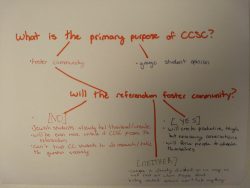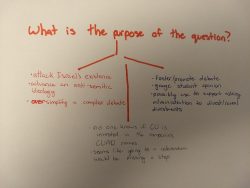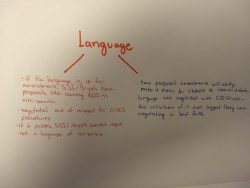If CCSC wants to boost attendance, they put a question about Israel on the agenda. Last night was no different. Senior Staffer Abby Rubel attended the meeting so you didn’t have to.
Last night, CCSC voted 20-17 against putting a question on the spring 2019 ballot that read, “Do you support Columbia’s divesting its stocks, funds, and endowment from categories of companies identified by CUAD’s campaign (i.e. divestment) – a tactic which CUAD’s Statement to the Columbia Community says is embedded in the BDS movement?” The initiative would have needed at least 25 “yes” votes (a ⅔ majority) to pass, eight more than the 17 votes it garnered.
In some ways, the meeting was more orderly than the last time CCSC discussed putting a question about the BDS (Boycott, Divest, Sanction) movement on the ballot. The council had clearly anticipated the number of people who would attend the meeting and had procedures in place for funneling students into an overflow room in Lerner 555, so very little actual bouncing was necessary. Those present in the Satow Room represented the students on both sides of the issue, many of them members of the same organizations present two years ago: Columbia University Apartheid Divest (CUAD), Students for Justice in Palestine (SJP), Columbia/Barnard Jewish Voice for Peace (JVP), Aryeh, Students Supporting Israel (SSI), and Columbia/Barnard Hillel.
The issues at play, however, were exactly the same, which CUAD member Zachary Aldridge, CC ’19, acknowledged before the meeting. He hoped, however, that the outcome would be different. “CCSC cares a lot more. They’re a lot more engaged. Besides that, this is identical,” he said.
CCSC President Jordan Singer (CC ’19) opened the meeting by reminding the council and the audience that the purpose of the night’s discussion was to focus on approving (or not) the proposed question and evaluating it with respect to feasibility, objectivity, and adherence to CCSC’s mission. She also reminded the room that “there are voices that are not going to be able to speak to us right now” because of limited space.
Both sides were then given ten minutes to present their stance to CCSC before the floor was opened for debate. Beyond simply defending the referendum, CUAD also proposed two changes to the wording of the referendum, revising it to read, “Do you support Columbia University divesting its stocks, funds, and endowment from categories of companies identified by Columbia University Apartheid Divest (CUAD)’s campaign, as part of the broader Boycott, Divestment and Sanctions (BDS) movement?” After other speakers were given a chance to present their views, the discussion turned over to CCSC.
The argument largely revolved around questions too complex to address in this space. Readers interested in learning more can check out SSI’s Facebook, Aryeh’s website, CUAD’s website, JVP’s Facebook, and Bwog’s previous coverage of this debate, which discusses many of the same questions. We have also created graphics outlining the main questions and arguments of the evening.
Beyond the oft-repeated arguments for and against the amendment, there were two aspects of the meeting that stood out.
First, both VP Finance Adam Resheff and Disability Services Representative Aaron Liberman said they would resign if the referendum passed. Resheff called the current discourse surrounding this issue “hostile,” “tense,” and “unnerving,” and argued that CCSC shouldn’t expect the discourse surrounding a ballot initiative to be any more productive. He also expressed worries that, should the ballot pass, the burden would be placed on Jewish students to explain why it is anti-semitic. He implied that CCSC would not, for example, expect black students to do the emotional labor of explaining why an analogous question is racist. Ultimately, “if we vote for this, I couldn’t continue on this council,” he said.
Liberman expressed similar opinions. He argued that the question itself was anti-semitic, and that CCSC passing it would be a statement that he, as a Jewish student, had no place on the council or on the campus. He stated that he would have to resign because voting to put the referendum on the ballot would be “betraying our very mission.”
Secondly, a large part of CCSC’s discussion focused on whether they could trust Columbia students to engage in productive conversations on the topic and inform themselves, or if the student body would avoid engagement and either not participate or rely on their friends to tell them how to vote. Although VP Policy Elise Fuller cited the large amount of research she did to prepare for the meeting and generally argued that the referendum would create a productive debate, she admitted that council members approached her to ask how to vote, perhaps foreshadowing how the debate could play out on campus. Class of 2022 President Eva Bogomilova agreed that there should be a discussion and said she had learned a lot, but also said that she didn’t think CCSC could expect the same from the general student body and argued that the question would become a popularity contest. Other CCSC members expressed similar views.
On the other hand, Class of 2019 President Mina Mahmood asked, “When did we decide that our constituents don’t care? How can we say that we don’t believe in our constituents?”
Fact Checking:
There were a few pieces of information that came into question as the night wore on.
Has the BDS movement been linked to increased anti-semitism on campuses?
A Brandeis study examining the link between them can be found here. Note in particular the Columbia-specific section on page 23—the authors did not include the Columbia data in their paper because it was too sparse, but the little data they did gather indicated that “hostility perceived by Jewish students at Columbia is closely connected to criticism of Israel and the BDS movement in particular.”
What does Bollinger think of the BDS movement?
When asked about it at the most recent Fireside Chat, Bollinger “pointed out that, in general, universities don’t take political positions and when they do, it requires some kind of campus consensus that does not currently exist for the BDS movement,” according to Bwog’s coverage of the event.
How many American Jews support Israel?
Throughout the night, opponents of the referendum cited the statistic that 90% of American Jews supported Israel. For detailed statistics on the subject, check out page 81 of this Pew research study.
Anti-Semites on Barnard’s SGA
A few non-CCSC students also repeated a story that last year, during Barnard’s referendum, an SGA member told someone she had a “list of Jewish enemies.” Although current SGA President Nicola Kirkpatrick said that she was not an elected leader of SGA last year, and therefore couldn’t comment on what was said during the referendum process, under her leadership “no such statements have been made and no such attitudes have been discussed or expressed within the Council.”
Graphics via Abby Rubel


 8 Comments
8 Comments



8 Comments
@Anonymous supporting an apartheid state whose stated goal is ethnic cleansing is cool i guess
@Anonymous why do you hate the jews? did a jewish girl dump you once? it must be very nice to live in a world where all your problems are blamed on a very small group of people
@Anonymous this ain’t it chief
@Anonymous Tbh I’m impressed, good going this time
@the fuck is this? abby this is not journalism
@C Ehrlich good report too bad this phillistine doesn’t get it
@Anonymous Reporting on things that have happened isn’t journalism?
@Anonymous You’re not journalism.